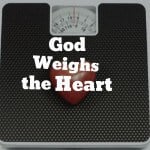⏱️ Estimated Reading Time: 4 min read
 Every way of a man is right in his own eyes, but the LORD weighs the hearts. Proverbs 21:2
Every way of a man is right in his own eyes, but the LORD weighs the hearts. Proverbs 21:2
Here we have a very interesting and noteworthy comparison, one that really speaks to a core issue of life. First, we have the approach of humanity. This approach views all of life through the lens of their own perception, often devoid of any sense of relating choices to the foundation of Scripture. It is the old methodology of doing what feels right. How many times have you heard someone say they were led to do something because their heart said it was okay? One thing we know about letting our hearts lead us and that is the heart is not a very good guide. In fact, Scripture says “The heart is deceitful above all things, and desperately sick; who can understand it?” (Jer. 17:9)
On the other hand, Proverbs 21:2 states that God weighs our hearts. Now this does not mean that He excuses behavior as long as we can somehow demonstrate that our “heart” was in the right place? Wrong behavior that falls short of God’s standard is sin – pure and simple. So what does it mean that God’s weighs our hearts? Perhaps some insight can be found in the meaning of the word translated as weighs or ponders. It is the Hebrew verb takan which connotes the idea of examination.
This, of course, begs the follow-up question as to the basis or standard of examination. We certainly know God is a holy and righteous judge so that means He will judge based on a holy and righteous standard. When it comes to understanding what is being stated in the last half of Proverbs 21:2, we can go back a few chapters to Proverbs 16:2 which shares a very similar train of thought by noting, “All the ways of a man are pure in his own eyes, but the LORD weighs the spirit.”
As we noted, the term takan describes the idea of actions being placed on a balance scale. More specifically, “the judgment of a man regarding the cause of life, which it is good for him to enter upon, lies exposed to great and subtle self-deception; but God has the measure and weight; i.e. the means of proving, so as to value the spirits according to their true moral worth; his investigation goes to the root, his judgment rests on the knowledge of the true state of the matter, and excludes all deception, so that thus a man can escape the danger of delusion by no other means than by placing his way, i.e., his external and internal life, in the light of the word of God, and desiring for himself the all-penetrating test of the Searcher of hearts, and the self-knowledge corresponding to the result of this test.”[1]
I trust you can identify a recurring theme in Keil and Delitzsch’s excellent explanation. It is a theme we have been attempting to drive home recently, namely that of anchoring firmly in God’s Word as the source of truth. Maturity in the faith is demonstrated in part by moving past the approach of doing what feels right or following our heart and moving towards a place of understanding that how we love God and love others is outlined for us in God’s Word. If we say we love God, then we demonstrate that love by a desire to keep His commandments. In doing so, we grasp the often huge difference between doing what seems right to us and the perfect standard God upon which God weighs our hearts and actions.
God’s Word is a lamp to our feet and a light to our path. It shines upon our dark hearts with the truth provided to us by God. If we claim to want to know His ways and His thoughts and to be His followers, we have to jettison living life and even doing theology based on what seems right to us or what seems comforting to us theologically. What seems right is irrelevant in the grand scheme of things. What is important is doing what God has told us to be doing. We can find His instructions in Scripture – the guidebook for righteous and holy living.
References:
[1] C. F. Keil and F. Deliztsch, Commentary on the Book of Proverbs (Peabody: Hendrickson Publishers, 1966), 242.




